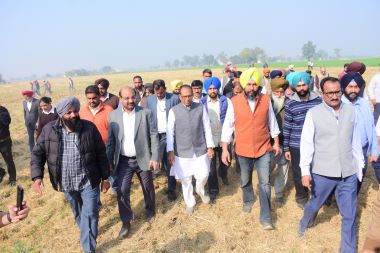27 November 2025, Moga/LudhianaICAR–Agricultural Technology Application Research Institute, Ludhiana, in collaboration with Punjab Agricultural University, Ludhiana, and KVK Moga, organised a flagship programme, Stakeholders’ Dialogue on Crop Residue Management, today at Ransinh Kalan village, Moga district. The event received national attention with the presence and leadership of the Union Minister for Agriculture and Farmers’ Welfare, Shri Shivraj Singh Chouhan, who interacted extensively with farmers and reviewed on-ground technologies.
Before the formal proceedings, Shri Chouhan paid obeisance at the village’s main Gurdwara Sahib and planted a sapling, symbolising his commitment to environmental protection and sustainable agriculture. Ransinh Kalan has emerged as a benchmark village by maintaining 100% residue-burning-free status across its 1,310 acres for six consecutive years through complete adoption of in-situ crop residue management technologies.
During his field inspection, the Minister visited wheat fields of S. Gopal Singh, sown with the Happy Seeder, and interacted with S. Avtar Singh on paddy straw incorporation in potato cultivation and with S. Jagsir Singh on residue-based mustard management. He conducted a socio-economic and agronomic review, highlighting that residue incorporation strengthens soil organic carbon, fertility, input-use efficiency, and long-term sustainability.

Addressing the media and farming community, Shri Chouhan praised the village’s technology-driven and community-led transformation, powered by youth participation, strong local governance, and institutional convergence. He commended the efforts of Sarpanch S. Inderpreet Singh and the Gram Panchayat for establishing exemplary facilities, including a sewage treatment plant, recharge ponds, a knowledge library, a cultural library, a village cleanliness mission, and well-developed rural infrastructure positioning Ransinh Kalan as a national model.
The Minister noted Punjab’s remarkable progress in reducing stubble burning, stating that farm fire incidents have dropped to fewer than 5,000 this year compared to over 83,000 four years ago. He further highlighted a 95% reduction in residue burning in 2025 compared to last year, reflecting a significant behavioural shift towards burning aversion and climate resilience. He also advocated wider adoption of paddy straw incorporation in potato belts and emphasised crop diversification as a pathway to soil health restoration, oilseed-based value addition, and improved farmer livelihoods.
Providing a national perspective, Dr. M.L. Jat, Secretary (DARE) and Director General (ICAR), described Punjab’s achievements as a milestone in sustainable agriculture and environmental stewardship. He stated that burning-free villages reduce dependence on imported fertilizers, enhance soil biology, conserve groundwater resources, and mitigate greenhouse gas emissions. He acknowledged the critical role of ICAR–ATARI and KVKs in driving long-term behavioural change through structured extension strategies.
Technical support during the briefing was provided by Dr. Rajbir Singh, Deputy Director General (Agricultural Extension), ICAR, and Dr. Parvender Sheoran, Director, ICAR–ATARI, Ludhiana, who presented the decade-long declining trend in stubble-burning incidents.
Delivering the vote of thanks, Dr. Rajbir Singh commended KVK Moga and the village Panchayat for their leadership and called for scaling the Ransinh Kalan model across Moga district and neighbouring regions to achieve broader residue-burning mitigation.
The programme concluded with a Minister-led field visit and media interaction, reaffirming collective commitment towards clean air, soil enrichment, efficient resource use, crop diversification, youth-led sustainability initiatives, and farmer-centric rural transformation in Punjab.
More than 1,000 farmers and farm-women from 17 villages across four districts participated.
(Source: ICAR-Agricultural Technology Application Research Institute, Ludhiana)








Like on Facebook
Subscribe on Youtube
Follow on X X
Like on instagram